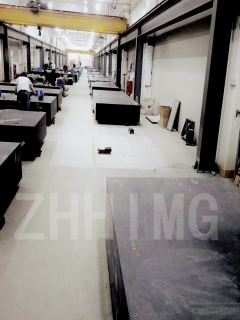Precision granite bed is a crucial component in OLED equipment. The thermal expansion coefficient of this granite bed has a significant impact on its application in OLED production. In this article, we will discuss the effect of the thermal expansion coefficient of precision granite bed on its application in OLED equipment and the solutions to overcome them.
Firstly, let us understand what precision granite bed is. Precision granite bed is a material made from natural granite that has been modified to produce a flat surface. Due to its high density, stiffness, and low coefficient of thermal expansion, it is used as a base for high-precision measurements and production processes. The precision granite bed is the foundation of an OLED equipment, which is responsible for providing a stable, flat, and rigid surface for production.
The thermal expansion coefficient is a measure of the rate at which a material expands or contracts when exposed to temperature changes. In the case of precision granite bed, temperature changes can cause a mismatch between the size of the bed and the equipment, leading to improper registration and alignment of the OLED display layers. This mismatch can cause defects in OLED displays, leading to product failure and a decrease in yield.
Therefore, the thermal expansion coefficient of the precision granite bed must be carefully analyzed and controlled during the production process. There are several ways to control the thermal expansion coefficient of precision granite bed, including selecting granite with a low coefficient of thermal expansion, using composite materials that have a lower expansion coefficient and designing a thermal management system that can control temperature changes.
Using granite with a low coefficient of thermal expansion is the most effective way to reduce the thermal expansion coefficient of the precision granite bed. This will ensure that the granite bed does not expand or contract significantly during the production process, minimizing the risk of defects in OLED displays.
Another solution is to use composite materials such as carbon fiber-reinforced polymer (CFRP) and epoxy granite, which have a lower coefficient of thermal expansion than natural granite. These composites offer additional advantages over natural granite, such as increased stiffness, damping, and vibration resistance.
Designing thermal management systems is another effective solution to reduce the impact of thermal expansion on precision granite bed. Thermal management systems can control the temperature of the granite bed to minimize temperature changes, which in turn will reduce the thermal expansion coefficient of the bed.
In conclusion, the thermal expansion coefficient of precision granite bed has a significant impact on its application in OLED equipment. Manufacturers must carefully analyze and control the thermal expansion coefficient to prevent product failure and yield loss. Selecting granite with a low coefficient of thermal expansion, using composite materials, and designing thermal management systems are effective solutions to overcome this challenge. By implementing these solutions, manufacturers can ensure that their OLED equipment is stable, reliable, and capable of producing high-quality OLED displays.
Post time: Feb-26-2024

